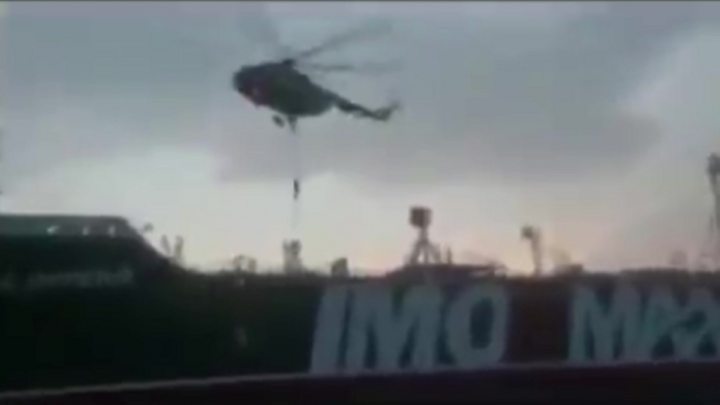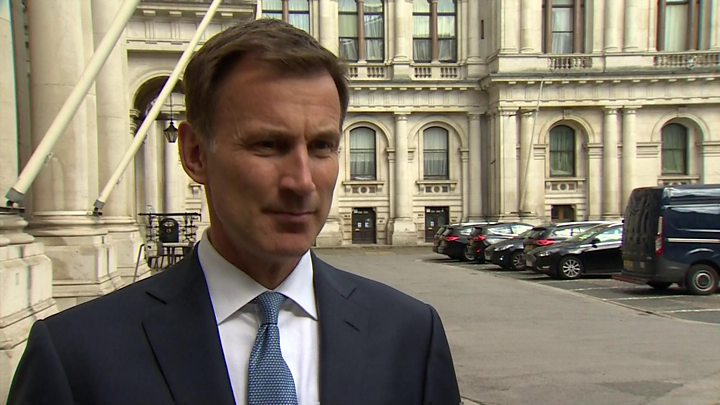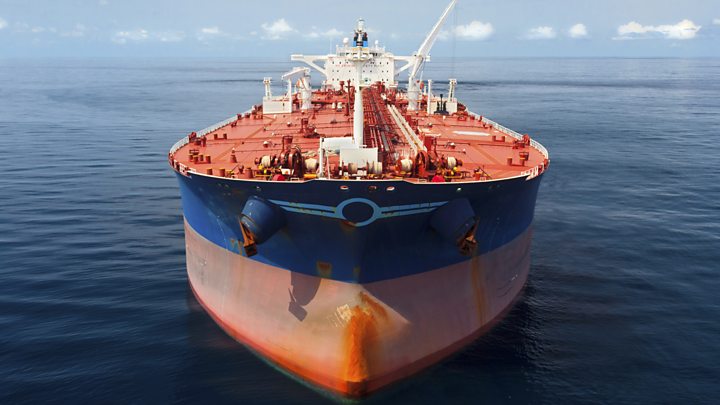A recording has emerged of radio exchanges between a Royal Navy frigate and Iranian armed forces vessels, moments before a UK-flagged oil tanker was seized in the Gulf on Friday.
In the recording, an Iranian vessel tells HMS Montrose it wants to inspect the Stena Impero for security reasons.
Chancellor Philip Hammond said the government would pursue “every possible diplomatic route” in response.
But Iran’s ambassador to London warned the UK against escalating tensions.
Hamid Baeidinejad said in a tweet: “This is quite dangerous and unwise at a sensitive time in the region. Iran however is firm and ready for different scenarios.”
The UK’s foreign secretary has urged Iran to reverse the tanker’s “illegal” seizure.
Jeremy Hunt said MPs would be updated on Monday about what “further measures” the government would take.
What happened?
On Friday, the Stena Impero was seized by the Iranian Revolutionary Guard in the Strait of Hormuz, a key shipping route in the Gulf.
Tehran said the vessel was “violating international maritime rules”.
Video released by Iran’s Revolutionary Guard-affiliated Fars news agency on Saturday appeared to show the moment the tanker was raided.
It shows masked forces dropping down ropes on to the ship from a helicopter after it was surrounded by high-speed vessels.

HMS Montrose was alerted but it was too far away to stop the seizure.
Iran’s state-run IRNA news agency said the tanker was captured after it collided with a fishing boat and failed to respond to calls from the smaller craft.
But Foreign Secretary Jeremy Hunt said it was seized in Omani waters in “clear contravention of international law” and then forced to sail into Iran.
The tanker’s owners, Stena Bulk, said it had been complying with regulations and had been in international waters.
It said it had requested access to the port of Bandar Abbas to visit crew members, who are Indian, Russian, Latvian and Filipino, and said to be in good health.
The seizure of the Stena Impero comes two weeks after Royal Marines helped seize Iranian tanker Grace 1 off Gibraltar, because of evidence it was carrying oil to Syria in breach of EU sanctions.
Mr Hunt said the Grace 1 was detained legally, but Iran described said this was “piracy” and threatened to seize a British oil tanker in retaliation.
What’s in the recording?
In the radio recording the Iranian vessel can be heard telling a ship – thought to be the Stena Impero – to change its course, saying: “If you obey you will be safe.”
HMS Montrose identifies itself in the recording, obtained by British maritime security firm Dryad Global.
It tells the Stena Impero: “As you are conducting transit passage in a recognised international strait, under international law your passage must not be impaired, impeded, obstructed or hampered.”
The frigate then asks the Iranian vessel to confirm it is not “intending to violate international law” by attempting to board the tanker.
How did the UK react?
Speaking after a call with his Iranian counterpart on Saturday, Mr Hunt said Iran viewed this as a “tit-for-tat situation” but he added that “nothing could be further from the truth”.
Ministers have held emergency Cobra meetings and a senior Iranian diplomat was summoned to the Foreign Office.

“Our priority continues to be to find a way to de-escalate the situation,” Mr Hunt said.
The government is advising UK shipping to stay out of the area.
Defence minister Tobias Ellwood told Sky News sanctions against Iran were among the options being considered in response.
Speaking to Sky News on Sunday, Mr Ellwood denied that the UK had taken its “eye off the ball” and said “it is impossible simply to escort each individual vessel”.
Labour shadow justice minister Richard Burgon told the same programme the UK should avoid becoming Donald Trump’s “sidekicks” and warned that a US-backed conflict with Iran could be worse than the Iraq War.
What has Iran said?
Iran’s foreign minister Javad Zarif tweeted that the UK “must cease being an accessory to #EconomicTerrorism of the US”.
He said Iran guarantees the security of the Gulf and the Strait of Hormuz, and insisted its action were to “uphold international maritime rules”.

What’s the background to this?
The latest developments come against a backdrop of deteriorating relations between Iran and the UK and US.
Tensions between the US and Iran have risen since April, when the US tightened sanctions it had reimposed on Iran after unilaterally withdrawing from a 2015 nuclear deal.
The US blamed Iran for attacks on tankers since May, which Tehran denies. On Friday, the US claimed to have destroyed an Iranian drone in the Gulf.
The UK government has remained committed to the deal, which curbs Iran’s nuclear activities in return for the lifting of sanctions tensions.
However, the UK’s decision to help seize the Iranian tanker Grace 1 earlier this month infuriated Iran.
Last week, Iranian boats attempted to impede a British oil tanker in the region before being warned off by HMS Montrose. Iran denied it was attempting to seize the ship.
International reaction
A White House National Security Council spokesman said Friday’s incident was the second time in over a week the UK had been “the target of escalatory violence” by Iran.
And US Central Command said it was developing a multinational maritime effort in response to the situation.
The Pentagon has said US troops are being deployed to Saudi Arabia to defend American interests in the region from “emergent credible threats”.
France and Germany called on the Iranian authorities to quickly release the Stena Impero.
The European Union’s foreign affairs office, which represents 28 member states, expressed “deep concern”.
Diplomatic solution ‘will be complicated’
A diplomatic solution to this crisis is going to be complicated, not least because Britain’s relationships with its traditional partners – the US and the Europeans – are under strain.
Diplomatic pressure – action at the UN or tough economic sanctions – requires the building of a coalition.
Think back to the collective action taken against Moscow in the wake of the murder of a British woman by Russian agents in Salisbury.
The US and Britain’s Nato and European allies all expelled Russian diplomats in an impressive show of solidarity.
But will the same solidarity be shown towards Tehran?
France and Germany have given London rhetorical support. President Trump is standing beside his British ally.
But the US and the EU are fundamentally at loggerheads over the fate of the nuclear deal with Iran and what many European capitals see as a thinly disguised US policy that seeks regime change in Tehran.
How ‘British’ is the tanker?
Ships must fly the flag of a nation state, explains Richard Meade, managing editor of maritime intelligence publication Lloyd’s List.
But that doesn’t need to be the same nation as its owners, its crew, or its cargo, he says.
The Stena Impero is Swedish-owned and those on board are Indian, Russian, Latvian and Filipino.
But it’s the UK flag that is important symbolically, he says. “Historically speaking it means that the UK owes protection to the vessel.”
“The UK has political responsibilities to anything that is flagged. And that’s why it’s much more serious than if there just happened to be a British captain on board.”
He says the impact on trade in the region had so far been minimal, but warns that if the international community began viewing the Strait of Hormuz as a dangerous place, it could create a “very different” scenario.
Highly volatile
The seizing of a British-flagged tanker in Omani waters, empty and inbound to a Saudi port, marks a serious escalation in a whole catalogue of recent incidents in the Gulf.
It comes on the back of the mysterious mining of tankers, the downing of both US and Iranian drones and the near capture of another British-flagged tanker only a few days ago.
Britain wants its response be two things: Measured and multinational.
The government is trying to send a robust message to Iran that this action is unacceptable, not just to the UK but to the rest of the world, but not so robust that it ends up being part of an avoidable US military strike.
This has become a highly volatile situation where not everyone believes in diplomacy. There are figures in Washington who have been pushing for an ever-tougher line with Iran.
And there are figures in Iran, notably in the Revolutionary Guards Corps and the security apparatus, who are quite prepared to push this right up to the brink of a conflict, yet probably stopping just short of one.



